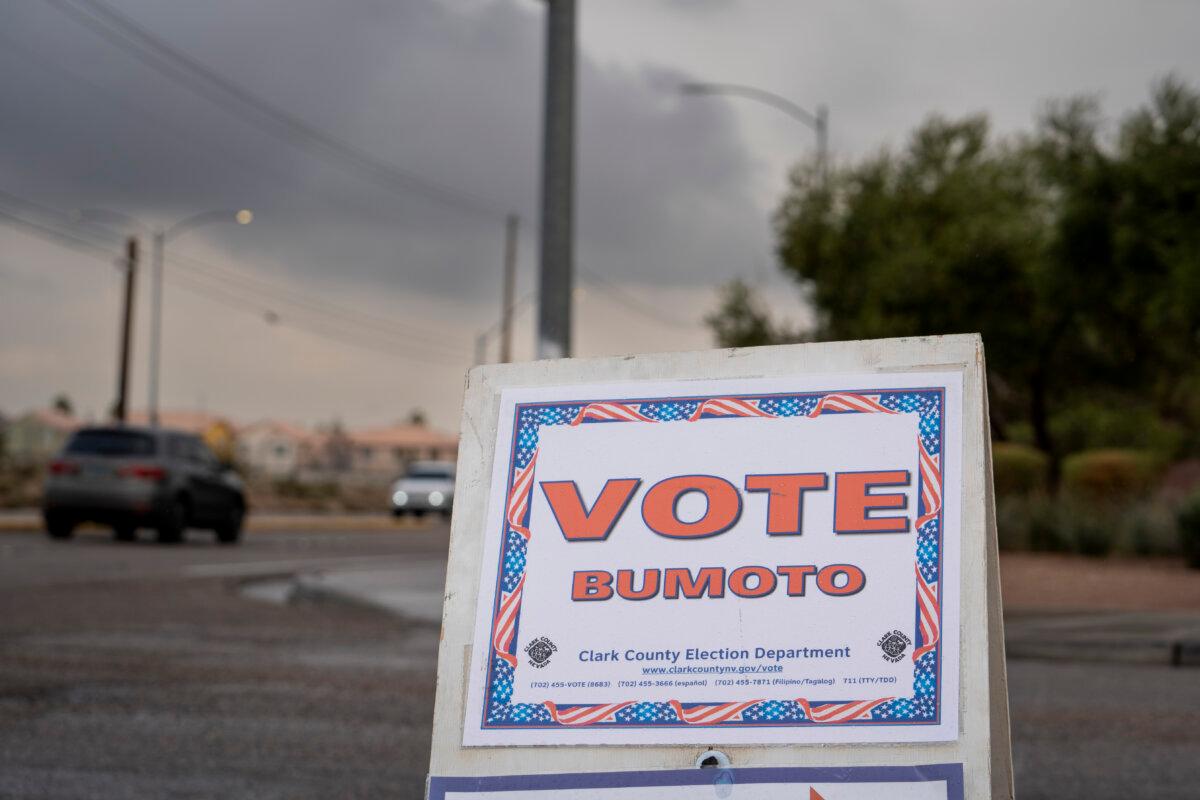Sam Brown appears to be edging closer to Sen. Jacky Rosen in a contest the incumbent first-term Democrat enjoyed a lead of 5 percentage points in 2018.
Nevada Republican U.S. Senate candidate Sam Brown appears to be gaining ground in the last days of his underdog campaign to unseat first-term Sen. Jacky Rosen (D-Nev.), who defeated the last Republican to represent triple-tier battleground Nevada in the Senate by 5 percentage points in 2018.
FiveThirtyEight’s Nov. 2 poll aggregate has Rosen leading by a composite of 5.6 percentage points. A Nov. 3 RealClear Politics (RCP) Pollster Scorecard compilation of nine Rosen-Brown polls since Oct. 8 has Rosen up in eight by an average of 4.6 percentage points.
New polls indicate the race may have gotten closer over the last 10 days.
The four most recent polls posted on RCP’s scorecard show significant variation, with the race a tie and the challenger leading in another.
A New York Times/Siena Oct. 24–Nov. 2 survey of 1,010 likely voters had Rosen up by 9 percentage points, and an Emerson Oct. 29–Oct. 31 poll of 700 likely voters put Rosen in the lead by 4 percentage points.
During this same time span, an Atlas Intel Nov. 1–Nov. 2 survey of 782 likely voters called the race a tie, and a Susquehanna Oct. 28–Oct. 31 poll of 400 likely voters has Brown leading by 1 percentage point.
The Cook Political Report, which forecasts political races, rates the Nevada Senate race as leaning toward Rosen, as does Sabato’s Crystal Ball and Inside Elections with Nathan L. Gonzales.
The candidates’ latest campaign filings show that Rosen has nearly doubled Brown in fundraising.
According to the Rosen campaign’s latest Oct. 16 Federal Elections Commission (FEC) report, it had raised more than $38 million, spent $40 million, and has $4.425 million cash on hand.
The Brown campaign’s Oct. 19 FEC report shows it has raised $19.8 million, spent $17.56 million, and has no money in the bank.
While Brown is still very much the underdog, the tightening Nevada race and potential for an upset has further buoyed Republicans’ odds of flipping Democrats’ 51–49 Senate majority.
Unlike 2022’s midterms, when the GOP was defending 20 of 34 seats in the split 50-50 chamber, Democrats and the four independents who caucus with them in 2024 are defending 23-of-33 seats on Nov. 5. Republicans need only flip two to notch chamber leadership if they hold onto their seats.
Rosen entered the 2024 election cycle as one of about 18 Democrat Senate incumbents seeking reelection as favorites in states rating services, such as Cook Political Reports and FiveThirtyEight, deemed safe or leaning Democrat.
Since then, Brown has gained momentum as the Republican ticket, spearheaded by GOP presidential candidate former President Donald Trump, has chipped away at the projected lead of the Democratic presidential candidate Kamala Harris and down-ticket party hopefuls.
One of the most significant indicators that Brown could upset Rosen, who unseated Sen. Dean Heller (R-Nev.) in 2018 by 5 percentage points, is Republican dominance in the Oct.19–Nov. 1 early in-person voting results and gains in voter registration—an accelerating trend since 2022.Rosen, 67, was a computer programmer and first-time candidate recruited by Sen. Harry Reid (D-Nev.) in 2016 to run for the open Las Vegas-area Congressional seat held by the retiring Rep. Joe Heck (R-Nev.). She narrowly defeated Republican Danny Tarkanian in that race.
Reid, who served 30 years in the Senate before retiring in 2017 and being succeeded by Sen. Catherine Cortez Masto (D-Nev.), endorsed Rosen in her 2018 Senate bid. Rosen won that race by 5 percentage points, defeating incumbent Sen. Dean Heller (R-Nev.), the last Nevada Republican to serve in the U.S. Senate.
Rosen, who is backed by the influential Culinary Workers Union in Las Vegas, has built much of her campaign on platform issues advocated by Democrats nationwide up and down the ballot, most notably abortion access, protecting the Affordable Care Act, and shielding Medicaid from cuts.
In campaign stumps, she said her six years in the Senate shows that she is a bipartisan and independent problem solver who is willing to cross party lines and is receptive to her conservative constituents’ issues.
Rosen routinely refers to Brown as a “MAGA extremist” who would be a “yes man” in a second Trump administration. A longtime Nevada resident, she has noted Brown is a recent Nevada arrival from Texas who does not reflect the state’s moderate constituency.
Brown, 40, a West Point graduate and U.S. Army infantry officer who earned a Bronze Star with a “V” for valor and received a Purple Heart, was an infantry officer in Afghanistan when he was nearly killed by an improvised explosive device in Kandahar in 2008. He endured third-degree burns over 30 percent of his body.
When he formally declared he would run for the 2024 GOP nod against Rosen in July 2023, he was immediately endorsed by Trump over 12 other primary hopefuls and by National Republican Senatorial Committee chair Sen. Steve Daines (R-Mont.).
This is Brown’s second Nevada U.S. Senate bid. During the 2022 Republican primary, he earned support from some Democrats, especially veterans, when he ran as a no-name newcomer against Adam Laxalt, a former state attorney general with a polished resume and a well-known family name.
Brown’s grassroots “Duty First” campaign traveled the dusty desert canyon lands and—as he became known as Capt. Sam—drew donors and earned the Nevada Republican Party Committee’s endorsement before falling to Laxalt by 21 percent in their midterms primary.
Laxalt then lost the general election to Democrat incumbent Sen. Catherine Cortez Masto (D-Nev.) by 0.8 percentage points, less than 8,000 votes, and to spearhead Ron DeSantis’s Never Back Down Super PAC in the Florida governor’s 2024 Republican presidential primary campaign.
Brown went on to run for the Senate again in 2024 and has generally advocated for Republican standards in his campaign stumps.
Brown maintains Rosen is not the moderate she claims to be but a liberal progressive out of step with Nevadans and the mood of the nation.
He points to her vote for 2022’s Inflation Reduction Act, which Republicans blamed as among the key igniters fueling inflation, and cites her compliance with the current administration’s border and immigration policies among so-called progressive policies he’d undo as a commonsense conservative.

The two have met once in an Oct. 18 hourlong debate that focused on the nation’s economy, Nevada’s sluggish economic recoveries after the COVID-19 pandemic, and the state’s housing shortage.
Rosen said in a second six-year stint, she’d hold real estate “corporate investors” accountable for raising rental prices, which she maintains is collusion.
“If you’re in a housing shortage and these corporate investors come and buy up all the homes and they jack up the prices to unreasonable rates, that’s hurting your community,” Rosen said during the debate, noting she has introduced a bill that would “fine” real estate corporations for pricing residents out of their homes.
Brown said Rosen is among the Democrats responsible for the illegal immigration surge, saying that she has more security at her home in a gated community than the nation’s border does. He said she is incapable of rectifying what will require “a very big logistical undertaking” in securing the border and stemming the flow of illegal immigrants.
“We start with securing the border,” he said during the debate. “And then, we deport those criminals, like the 13,000 people who are convicted of homicide. We have convicted sexual assault people here as well. We can start there, but this is a huge undertaking.”
The Rosen-Brown outcome could pivot on turnout for Nevada Amendment 6, which asks voters to install “an individual’s fundamental right to an abortion” in the state’s Constitution.
Rosen has repeatedly referenced Brown’s stated positions on abortion from when he unsuccessfully ran for the Texas Legislature in 2014 when he supported a 20-week abortion ban. Brown maintains that is not an extreme position and that he does not support a federal abortion ban.

